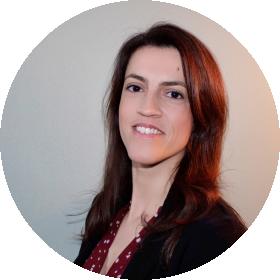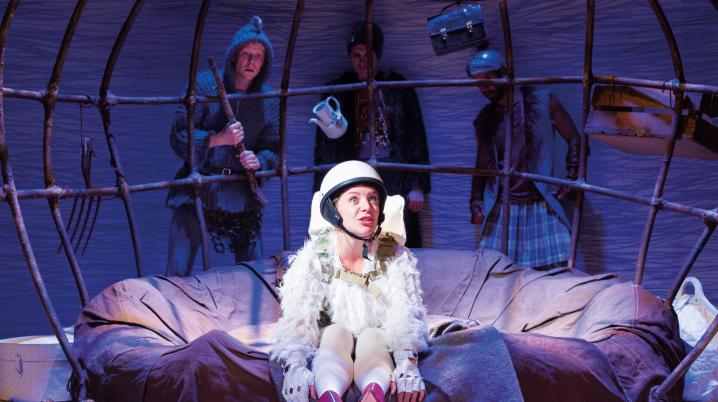
By Wladimir Riphagen
In October 2018, Mohamed El Ghawy, director of the Hakawy International Arts Festival for Children, visited a showcase event of Dutch youth theatre performances. Upon his visit, he invited three groups to come and perform at his festival last March, with the financial support of the Dutch Performing Arts Fund and the Dutch embassy in Cairo. They were Kwatta from Nijmegen, Maas Theater and Dance from Rotterdam, and de Stilte from Breda.
Amazed
We talked to Jochem Smit and Rogier van Erkel of theatre group Kwatta right after performing their show Jabber. For Rogier, this was an experience to remember. “This was more unique and more exciting than other shows abroad.” After their performances in Cairo, they visit a village close to El Minya, a city in Upper Egypt. Gerda van de Kamp, business director of Kwatta: “We were supposed to give one more show. A party venue was transformed into a theatre, stands were improvised, a grand piano was shipped in and then the kids came. There were so many more of them than we expected, so we decided to play two shows. It is truly a privilege to play for these kids, most of whom are looking at a theatre play for the first time and who are really watching and listening, all wide-eyed and amazed. Every other available square meter in the theatre was filled up by the adults from the village who wanted to see the play as well.”
Lisa Groothof and Dwayne Toemere of Maas theatre and dance had similar experiences. They performed their play Eitje not only in a theatre setting but also in a roofless, unfinished mosque in a working-class neighbourhood. This performance probably had the most significant impact on the crew. Groothof: “People showed up from all over the neighbourhood; they really swarmed in. Both kids and adults were watching with the same energy and the same sense of excitement. That was awesome. And it makes you realize again: age doesn’t matter.”
Improvisation
Jack Timmermans, artistic director of de Stilte, gave two master classes during the festival, one to graduated dancers and one to 15-17-year-olds who are training to become classical dancers. Timmermans was impressed by the participants’ devotion and determination. He, therefore, regrets not having been able to work together for a longer period of time, as he would have liked to forge a lasting link with Egypt. “We’re not all that different. In the end, it’s about universal themes such as solidarity, loneliness and death. But our methods do differ, and you’ve got to build some initial trust. We, the Dutch, don’t tend to really improvise a lot anymore. Whereas in Egypt, everything revolves around improvisation. Those are two extremes, and both have their goods and bads obviously.”
Timmermans quotes Mohamed el Ghawy as an example. “He says: ‘Egyptians are much better at driving cars.’ From my perspective, that’s not the case, because the traffic is chaotic and with a lack of road markings there seems to be no system; everyone just does as he pleases. But you can look at it the other way: if there are no lines, you’ve got to find your own orientation. That definitely has its value too.”
The festival’s director receives praise from various perspectives. Timmermans: “I really admire the way El Ghawy handles things. He is persistent and knows how to find the right avenues for funding.” Van de Kamp is equally laudatory: “It was fantastic to work together with the people of the Hakawy Festival, who have done everything in their power to make things happen in this special place. It required some improvisation skills by Nik Tenten and Thijs Kemper, the technical team of Kwatta. Performing in the province of El Minya - where there are almost no paved roads and where hospitality is ubiquitous - was incredible.”
Sustainable
But what is really the use of touring around the world with Dutch plays and performances? At Maas, this is a contested topic. Toemere: “What is the perspective on sustainability? What can we set in motion? Also, for me as a vegan and someone who is worried about the climate, these are serious matters to be thinking about. Is it really okay to get on a plane for just one performance? At this point, we’re facing more questions than answers, but we have to keep thinking about it.”
For the Kwatta team, it’s very important that Jabber is performed all around the world. They have been to many different places already. “I think Jabber shows that the world turns into a great place if you keep looking at it with curiosity and a sense of wonder,” explains Van Erkel.
Artistic freedom
Artistic freedom is an issue in Egypt. The domain of free expression is increasingly threatened in the last couple of years. For example, as reported by NRC, Egyptian guitar player Rami Sidky was detained for allegedly cooperating on protest songs, although in fact he was not involved in the production of these songs. The actors of Kwatta and Maas did not experience any limitations to their practice first-hand. During Kwatta’s workshop, Jochem Smit and Rogier van Erkel mainly concentrated on the exchange of artistic knowledge, while the topic of artistic freedom remained undebated. Perhaps there was not really a need to do so, something that has to do with the target audience. As El Ghawy indicated in an earlier interview with DutchCulture, theatre for kids is not seen as much of a disruptive force.
The workshops mostly provided insightful experiences. “The way I had always perceived Arabic had always been this kind of harsh language. But when you’re working with Egyptian actors you can really experience that it has something very soft and beautiful too. My view is now definitely more nuanced.” The artists also noticed that the Egyptian theatre sector is in dire straits. Smit: “There is a shortage of infrastructure, such as the lack of theatres to play in. Also, there is little room for the development of exciting young prospects.”
Maas’ theatre makers always think before they decide to perform in a particular country. Toemere: “Because what are you going to do? What are you contributing in a country where there is less freedom? The conclusion for us is: we want to add something to the theatre experience of children. That’s our idealism, that’s what it’s about in the end. And on top of that: what does anyone gain from closing those doors to countries where not everything happens the way you’re used to?”


